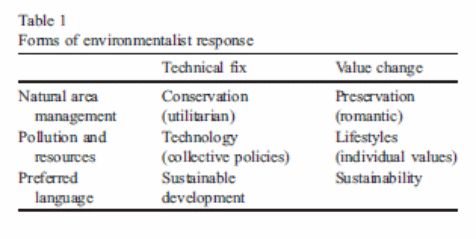Introduction
The topic of sustainability pulls together all the complex threads that have already been discussed in the previous modules and go-ahead to put some emphasis on the interconnectedness of the world systems. Professor John Robinson in this week’s paper argues that “The technical fixes are necessary and important but not sufficient”. By this, he implies that there is something more that sustainability ought to achieve in terms of creating an improved lifestyle for all people. Sustainability, therefore, ought to surpass the address of technical fixes alone and also address those issues that are profound, for instance, distribution, consumption, material needs, opportunity, and empowerment.
Environmental degradation
Professor John Robinson points out that improvements should be pursued actively especially in social and environmental consequences of the delivery of goods and services, and efficiency due to the already present deterioration of the environment and the misery of human beings in the entire world. He, therefore, suggests that issues like natural area management, pollution and resources, and the preferred language as shown by table 1 below, ought to be focused on as far as sustainability is concerned.
If this is done, then the negative effects likely to arise due to the achievement of a certain level of the well being of material will be greatly reduced. It will consequently create the potential of having the well-being of material on the increase without necessarily making the negative effects on the environment to increase.

Robinson further insists that making the designs of human systems to agree with the principles governing ecology is in line with developing an ethic for the environment that is recommended by most environmentalists. The larger the extent of the effects of not having sustainability, the more the negative effects on the environment need to be completely reduced per unit of activities contributing to the economy practiced.
This is because the sustainability challenge will not be sufficiently responded to by just having optimistic approaches like eco-efficiency, industrial ecology, bio-mimicry, and dematerialization among many others. The success in reducing the effects on the environment by the economic activities practiced does not automatically guarantee improvements in terms of the quality of life to the people.
I believe Robinson was quick enough to say that the technical fixes are not sufficient since those who are well-off usually disproportionately appropriate the above-mentioned approaches while the people at the bottom of the pyramid of socio-economy are left in a very pathetic state than they initially were. He supports this fact by pointing out that the supporting evidence is the enclave economies and the communities that are affluent in modern society.
The insufficiency of the necessity of the technical fixes when it stands all alone, is one of the lessons that Robinsons says can be learned from the commentary that he had written on the title “Squaring the circle? Some thoughts on the idea of sustainable development”. Sustainability as a value change therefore ought to address also other technical issues and not only the technical fixes that include conservation, technology, and sustainable development.
Conclusion
In my opinion, I strongly believe that Dr. Margo Fryer of UBC will agree with Robinson in her argument about our hopes for technological solutions. This is because the technological solutions are also covered by sustainability and form part of the other things that ought to be handled by sustainability above the technical fixes. I do also agree with Robinson since the technical fixes are not solely sufficient if the other issues like natural area management, pollution, and resources, and the preferred language are not focused upon.